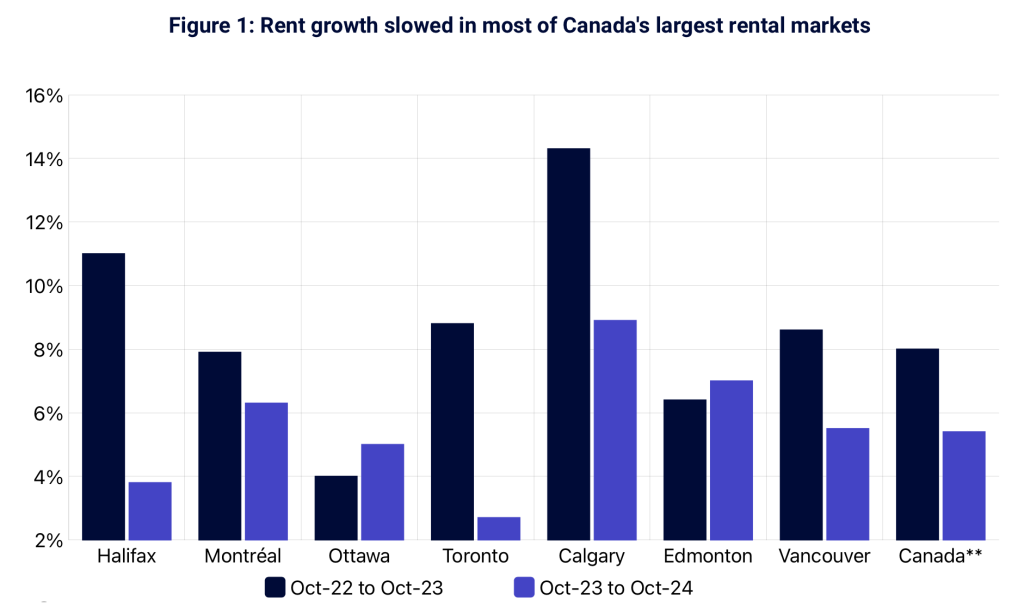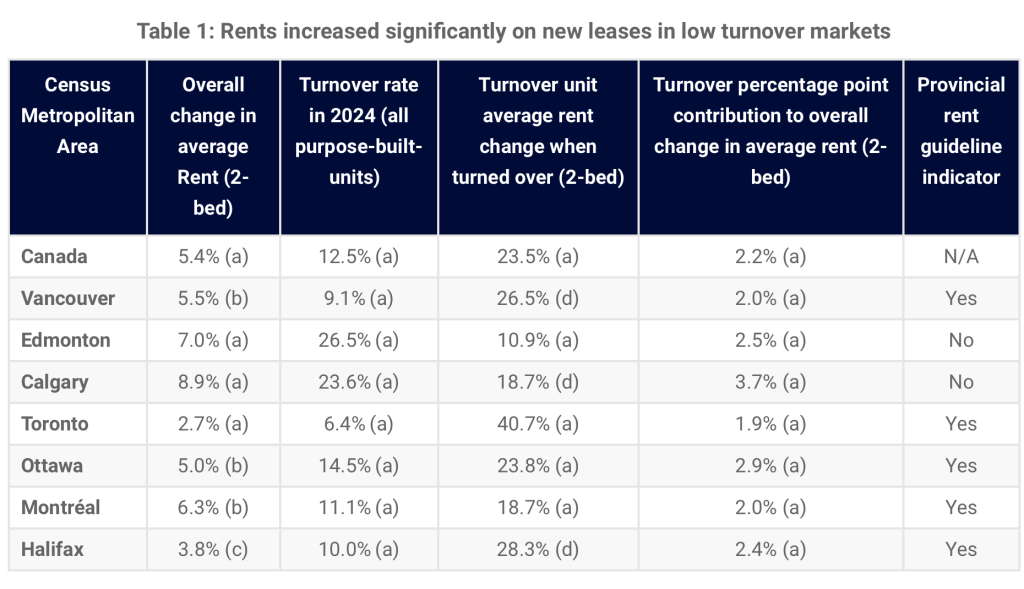Fall housing report shows Ottawa’s rent prices slowed in 2024

Posted Dec 20, 2024 03:34:03 PM.
Last Updated Dec 20, 2024 03:34:10 PM.
The Canada Mortgage and Housing Corporation (CMHC) released its 2024 Rental Market Report, revealing that a notable increase in rental supply growth has raised Canada’s vacancy rate.
While rent growth slowed in most of Canada’s larger markets, Ottawa diverged from this trend, with overall average rent growth slightly accelerating, wrote CMHC in a news release.
This was primarily driven by higher rent increases for new tenants at turnover and in newly completed units entering the market.
With both Ottawa and Edmonton differing from other major markets as 2024 rent growth slightly rose, rent increases in these areas in 2023 lagged the respective provincial averages.
But in 2024, stronger rental demand resulted in both cities catching up — with minimal adjustments for existing tenants and more significant rent increases for new tenants.

Toronto saw the lowest rate growth, declining from 8.8 per cent in 2023 to 2.7 per cent in 2024.
According to CMHC, this drop is the consequence of rising vacancy rates and the lowest turnover rate of surveyed cities.
“With a record increase in rental supply, landlords prioritized tenant retention by taking a more cautious approach to rent increases,” wrote CMHC.
In Ottawa’s neighbouring city, the number of newly available rental apartments in Montreal remained the highest on record, resulting in higher vacancy rates.
According to the Rental Market Report released by CMHC, rental market conditions remain tight across most major markets — with Canada’s supply of purpose-built rental apartments growing by 4.1 per cent.
This number represents the highest growth in over 30 years, elevating the national vacancy rate from 1.5 per cent in 2023 to 2.2 per cent in 2024.
“Affordability for Canadian renters remains a challenge, particularly for new tenants who faced significant rent hikes as units turned over,’’ said Tania Bourassa-Ochoa, CMHC’s Deputy Chief Economist. “However, record growth in rental supply helped slow down average rent growth and raise vacancy rates closer to the historic average.”
New tenants entering the rental market across Canada continue to face significant rent hikes. Average rent growth for a two-bedroom apartment saw a significant downturn in 2024, with rents rising to 5.4 per cent for a two-bedroom unit.
This number is down from a record 8 per cent in 2023, it noted.
But when a unit turned over to a new tenant, rent growth was similar to 2023 rates — sitting at 23.5 per cent in 2024. The data shows that turnover impacted one in eight units, and these units contributed to more than 40 per cent of total rent increases.
Additionally, the report said the rented condo market also remained consistent in 2024.
The average vacancy rate for rented condominiums in the 17 metropolitan centres surveyed by CMHC held steady at 0.9 per cent in 2024. This number is unchanged from 2023 and is down from 1.6 per cent in 2022.
But the report also found that vacancy rates in the Ottawa region increased this year, with the addition of a high number of new units to the rental market, said Francis Cortellino.
“In the last three years, Ottawa gained around 4,000 new units. But with international migration not as strong as before, the demand has slowed down, he explained.

Based on data from CMHC, average two-bedroom unit rent in Canada rose to $2,173 in 2024 from $2,049 in 2023.
While Ottawa saw a 23.8 per cent increase in average rent change when turned over, Toronto, Vancouver, and Halifax saw some of the highest rent increases for turnover units.
According to CMHC, low tenant turnover meant that when units became available, landlords had the opportunity to adjust rents to match current market levels. Consequently, higher rents made it more difficult for new renters to enter the market, it noted.
“The average rent in Ottawa is still below $2,000, which is less expensive than Vancouver or Toronto,” said Cortellino.
“The situation is difficult for many tenants across the country, but in Ottawa, I would say the average rent is a bit less expensive than Toronto and Vancouver,” he added.
As more purpose-built rentals were added across Canada, this brought relief to tight markets.
While demand remained high, Canada saw the highest supply growth in over three decades, and this outpaced demand — resulting in higher vacancy rates and a slowdown in rent growth, added CMHC.
Ottawa followed this trend, with a record number of new rental apartments pushing the vacancy rate higher.
“Census data shows that a larger share of renters live in the secondary low-rise market (single-detached, semi-detached, and row homes) in Ottawa compared to other large urban centres,” wrote the corporation.
This drop in low-rise completions resulted in a rise in demand for purpose-built rental apartments, and this was outpaced by stronger increases in supply.








